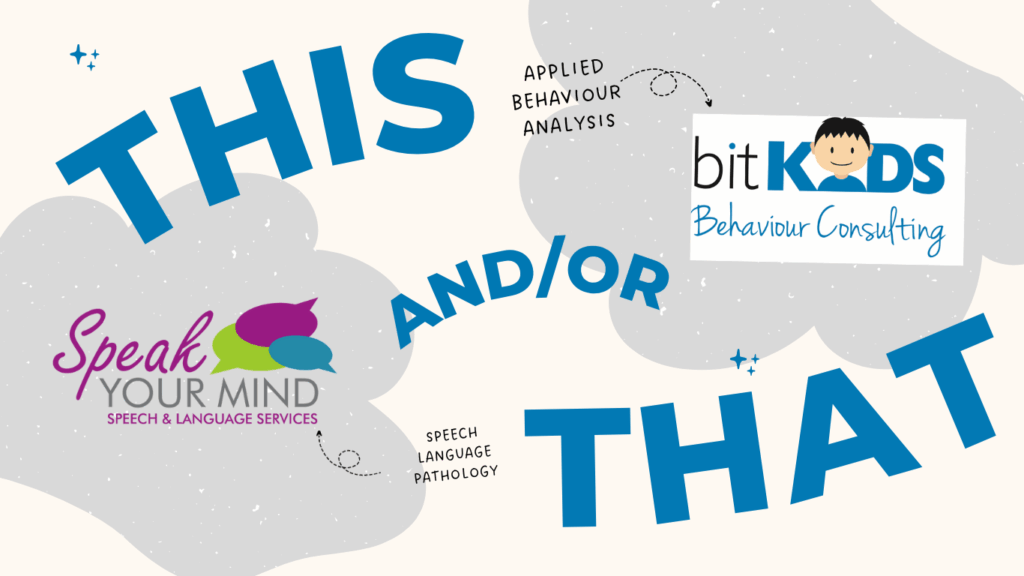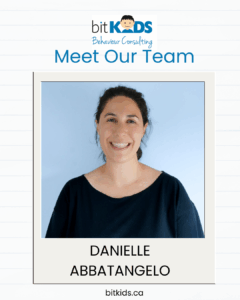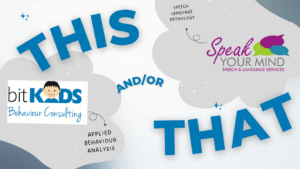Speaking with an SLP: SLP and ABA

An Interview with Briar Cipryk of Speak Your Mind
At bitKIDS Behaviour Consulting, we know that every child’s journey is unique. Families often ask whether their child needs speech therapy, ABA, or a combination of both. We sat down with Briar Cipryk, a Speech-Language Pathologist who works with many children on the autism spectrum, to talk about how SLP and ABA can work together to support language, communication, and making connections.
Introducing Briar Cipryk
Q. Can you tell us a bit about your background and what inspired you to become a Speech-Language Pathologist?
Back when Ontario still had Grade 13, I had the opportunity to complete a co-op placement at the Niagara Children’s Centre. It was during this experience that I discovered Speech-Language Pathology—a profession that beautifully blends the medical and educational fields. The therapists I observed at the Centre inspired me to pursue this career path. I went on to complete an undergraduate degree in Neuroscience at Brock University and a Masters in Communication Sciences and Disorders at McGill University.
Q. What kinds of children or areas of communication do you focus on?
I have a special interest in:
– supporting the Neurodiverse population.
– supporting children with both language and literacy disorders.
– supporting children with deficits in executive functioning skills.
Q. What does a typical SLP session look like for a child with autism or developmental delays?
My top priority is always to establish a connection with the child. Communication is an exchange—without a genuine connection, there’s no foundation for sharing ideas. Once we are co-regulating and having fun together, my next focus is helping the child become an active partner in deciding how we’ll spend our time. We call this creating a “group plan,” a process that naturally supports executive functioning skills. From there, the fun begins—through play, gross motor activities, people games, and the child’s preferred interests, we build language and support meaningful learning goals.
Understanding the Role of an SLP
Q. For parents who might be new to speech-language therapy, how would you describe what an SLP does?
A Speech-Language Pathologist (SLP) is a regulated healthcare professional who supports all aspects of communication. We work with both children and adults to help them express themselves and connect with others. In the early years, a pediatric SLP focuses on language development—such as learning new words, combining them into sentences, and we also support speech development – developing clear speech sounds. As children grow and enter school, we continue to support their language organization, comprehension, and turn to support their literacy skills. We need to ensure that children can build language skills to access the curriculum. Moreover, since social skills are deeply rooted in communication and understanding how to share space with others, SLPs also help children develop social language and learn how to build meaningful connections with the people around them. We help children understand “where am I, who am I with, what is my role?”
SLP vs. ABA – or Both?
Q. Parents often hear about both ABA and speech therapy — how would you explain the difference between the two?
ABA and speech therapy both aim to help children build meaningful skills that support independence and connection — we just approach those goals from different lenses.
As a Speech-Language Pathologist, my focus is on communication — helping children understand and express themselves in whatever way works best for them. That might mean developing a toolbox of communication strategies, such as AAC, writing, gestures, and/or spoken language. My work is grounded in building relationships, developing language, and creating authentic communication opportunities through natural routines and play.
ABA, on the other hand, focuses on behavior — understanding why behaviors occur and teaching new skills through structured teaching and reinforcement. While our goals can sometimes overlap, our perspectives and methods are different but can be complementary.
Choosing between SLP, ABA, or a combination of both isn’t always easy — and the right answer depends on your child’s unique needs, learning style, and goals. What matters most is finding a collaborative team that works together, communicates openly, and helps your child make progress that feels meaningful. Check in next week to hear from Corinna Bittle about how ABA and speech therapy complement each other and what successful collaboration at bitKIDS looks like.



